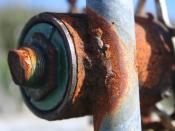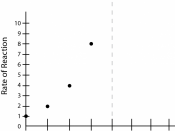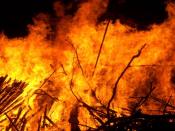Experiment: Investigation into the factors that effect the rate of reaction
I am going to investigate how different factors affect the rate of a reaction.
Introduction
What is a reaction? A reaction is when two particles (reactants) join to form a new product or products.
What is rate? Rate is a measure of how fast or how slow something is. Rate is a measurement of the change that happens in a single unit of time, any suitable measurement can be used such as seconds, minutes, hours or even days.
What is the rate of a chemical reaction? The rate of a chemical reaction is how fast the reactants react.
How to find the rate of a reaction? In general to find the rate of a reaction, you should measure either the amount of reactant used up per unit of time or the amount of product produced per unit of time.
The rate during the reaction does not stay constant, it changes throughout the reaction, its greatest at the start but gets slower as the reaction proceeds. I think this is mainly to do with the fact the longer the reaction has taken place the more of the reactants react leaving fewer reactants with less chance of reacting.
Successful collision. For the reactants to be able to react they have to successfully collide with each other. The chance of a successful collision can be increased or decreased by using many different factors.
Temperature - Temperature alters the rate of a reaction by supplying the reactant particles with more energy, the more energy the reactants have the faster they move around increasing they're are chance of bumping into one another and having a successful collision. Also the more energy they get from the heat the more particles have enough energy to react,


